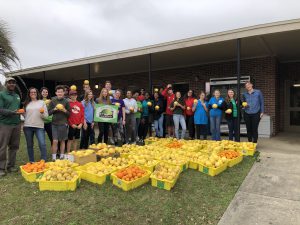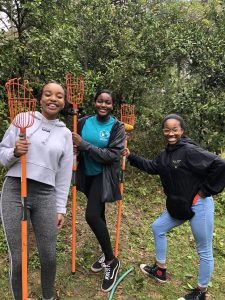From participating in a park clean up to sewing dog beds for the local animal shelter, many 4-H members are actively involved in community service projects as part of their 4-H club experience. 4-H members pledge their hands to larger service, making community service an important part of club membership. 4-H has historically given back to the community by encouraging young people and adults to volunteer. Giving back to the community allows members to learn the value of helping others, develop leadership and communication skills, feel empowered, grow their decision-making skills, and much more.
But, are these members involved in service-learning? What is the difference between a community service project and service-learning? How can you turn a club community service project into service-learning?
COMMUNITY SERVICE
Community service is work done by an individual or group that benefits others. This work is typically done in your own community, to directly benefit the members in your community. Examples of this type of service are conducting food drives, planting a community garden, creating holiday cards for nursing home residents, or helping serve meals at a shelter.
SERVICE-LEARNING
Compared to community service projects, service-learning is a method of teaching youth that fosters a deeper connection to the project. Service-learning merges a meaningful community service project with purposeful learning and reflection. Here’s an example: if youth serve lunch to veterans, they are providing a service to the community and that is considered a community service project. For that same project to become a service-learning project, additional learning and reflection opportunities are included. Youth would be involved in the planning process and would work together to select the service-learning project based on the needs of a community. Before serving lunch to the veterans, youth could learn about the challenges and issues facing veterans in the community from a guest speaker or they could conduct research independently to present at a club meeting. After the project, youth reflect on the experience of serving lunch to the veterans and share any feedback or results with the community.
Successful Service-Learning Projects Include Four Steps:
Step 1: Assess
Club members work together to identify and assess needs in their community. Youth can have a brainstorming session or take a club field trip to assess needs in-person. After identifying multiple needs, club members will take a vote on the best option for their service-learning project.
Step 2: Plan
This step will take the most time. It is important to schedule the appropriate amount of time to plan the project. This can occur during a club meeting for small projects or over the course of multiple meetings for larger projects. Use the information gathered during step 1 to develop a plan, timeline, list of supplies and roles and responsibilities for each team member. It is a good idea to identify potential problems that might occur. Safety and risk management procedures will need to be addressed during this step. Club volunteers can guide this youth-led process, but it is important to let club members take the lead in planning.
Step 3: Conduct Service Project
Time to complete your service project! The day of service is rewarding and exciting. Make sure you have the supplies needed and roles are assigned appropriately.
Step 4: Reflection
During and after the service project, it is important to pose reflection questions to the group and individuals. This allows youth to think about their project and draw a connection to the bigger picture. Why is the service being completed important? What have you learned from it? Has it taught you a new skill or changed your mindset about something? Most importantly, now that you have learned from the project, what are you going to with your new knowledge? Reflection can be through group discussion, journal writing, photographs, or multimedia presentations.
For more information on service-learning projects or other 4-H programs that build essential life skills in youth, please contact your local UF IFAS County Extension Office, or visit http://florida4h.org.
- Non-food Rewards for Kids - April 29, 2022
- Keep Mindfulness through the Holiday Back To School Transition - January 6, 2022
- 4-H Day at the North Florida Fair Recap - November 29, 2021



